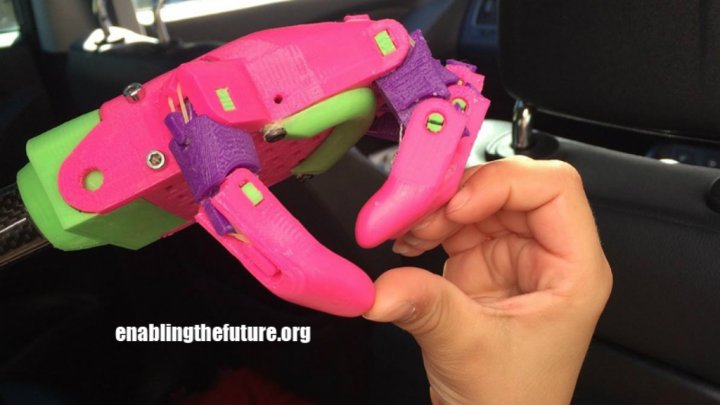01/12/2017 - Projects
We Are The Makers! Kick off meeting of a three years Erasmus + project

 Reading time: 2.5 minutes
Reading time: 2.5 minutesShool of Robotics is partner in a three-year Erasmus Plus project "We Are The Makers!" committed to apply IoT in Education to Humanitarin aims.
We Are The Makers! is an Erasmus + project co-financed by the European Commission, (ERASMUS+ PROGRAMME, STRATEGIC PARTNERSHIPS (KEY ACTION 2), AGREEMENT NUMBER 2017- VG-IN-BW-17-36-035615). Leading proponent is Johannes-Kepler-Gymnasium di Weil am Stad, the city where Johannes Kepler was born.
The project was developed thanks to the cooperation between some Partners and the Society e-nable France (http://enablingthefuture.org/2016/07/03/e-nable-france/) whose mission is to connect people who need a device with the people likely to make them. We Are The Makers! will train high school students in Germany, Italy, Denmark, France, and Rumania, to design and produce 3D printed hands devices for kids and teens without hands. The educational aim will be to improve the skills of European students in producing professional IoT deviced (the 3d printed hands will be "augmented" by an Arduino device).
We Are th Makers! Partners
Johannes-Kepler-Gymnasium Weil der Stadt, Germany;
Scuola di Robotica (Italy);
E-nable (France);
EDUMOTIVA (Greece);
Universitatea Valahia in Targoviste (Rumania);
Create It Real (Denmark)
THE PROJECT
The world – and world labour market – where young students are going to live and enter into are more and more characterized by a production and service fields where telecommunication systems and networks, robotics, and IoT (Internet of Things, linking physical and digital world) will be guiding the innovation processes. Every field of production and services is undergoing a profound change where innovation technologies are setting speed, frame, and direction. The first and most upfront fields where ICT is effecting those changes are certainly automatization production processes. However, almost all fields will be affected, from transportation to care; from health to fashion; from education to media and eco- sustainability. We are going to cooperated with robots, and even before, with intelligent, programmable objects at home, schools, hospital, factories, theaters, and our students will be part of the so called Maker movement, either in companies or in start-ups or in research centers (McKinsey Global Institute report, The Internet of Things: Mapping the value beyond the hype, 2015). 3D printing objects, associated with programmable kits will be consumer goods in every shop and home.
Educational institutions shall provide students with the set of skills and soft skills making them able to understand and grasp these changes and new opportunities with enthusiasm.
Actually, there is in Europe an urgent need to increase digital skills and competences. According to EC “Opening up education through new technologies”, 37% of the EU workforce has low digital skills, or none at all. Less than half of children attending schools are provided with highly equipped digitally tools– and only 20-25% of them are taught by teachers who are confident using technology in the classroom. Between 50% and 80% of students never use digital textbooks, exercise software or learning games.
The “Innovation Union” initiative under “Europe 2020” recognizes that weaknesses remain with science and technology teaching. Findings of current surveys of school students’ attitudes to Science and Technology witness lack of interest driven by a perception that Science and Technology subjects are hard and boring (TISME 2012). According to AdvanceED, one of the largest community of education professionals in the world, “students use technology and digital tools in every part of their lives – except school”. The study found few students use technology or digital tools in any meaningful way in their classrooms. In many cases, also when technologies are applied in schools, educational institutions finds many difficulties incorporating these in their programs, and generally innovation tools are simply added to old ways of teaching and learning. The whole methodology of education did not change.
We Are th Makers! project aims to provide teachers and students with: a) new educational tools (handbooks, libraries of programs); b) provide a learning and teaching methodology that are: meaningful, situated, contextualized, and that have a real, true value; c) provide a certification for the accuracy, adequacy and precision of students’ products. This certification is provided by one partner (e-nable) and it is coherent with the ethical aims (inclusion) of our project. Formal, informal and non-formal methodology shall be applied in We Are th Makers! , helping students to learn and work already at school with a precision and reality principle that they are going to apply in the world following their studies.
TRANSNATIONAL CONTEXT
We Are th Makers! will lead to designing new learning and teaching methodology where high schools students will be involved in using 3D printers and programmable breadboards to design, manufacture and program intelligent objects. These activities are complementary and facilitating the way young people will have to work in today’ labor market. Because students cannot be certified by the labor market, bow (asides from some period of working experience), We Are th Makers! certification is going to be provided the one partner (e.nal) that will be use sone of the objects profuced to assist disabled kids. This kind of “certification”, that is real, is also in line with the ethical aims of the project.
The primary aims of We Are th Makers! is to provide European educational systsem of a validated maethodology to introduce ICT and Educational robotics as “normal” subject in the European programs. We Are th Makers! will do it by providing Manuals for teachers, Manual for stdents and Libraries of programs to be allied to new educational technologies.
The other, very key, aim of the project is to provide teachers and students with the possibility to finalize their IoT’s for end users who will be tested their products. Because partner Creat It REAL has a longstanding cooperation with e-nable France, the IoT products developed during the project will be tested by kids affeted by agenesia.

